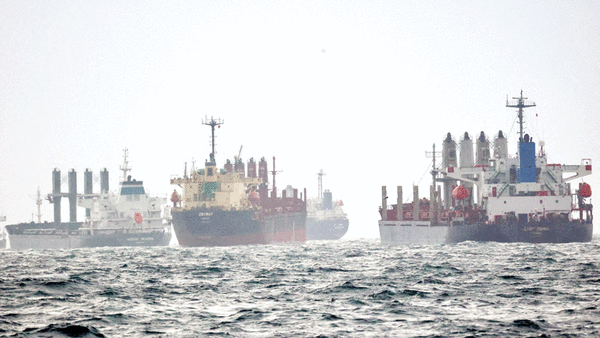

MOSCOW: The Kremlin on Wednesday said the outlook for the landmark UN-brokered Black Sea grain deal was not great as promises to remove obstacles to Russian agricultural and fertiliser exports had not been fulfilled.
The grain deal is an attempt to ease a food crisis that predated the Russian war on Ukraine, but has been made worse by the most deadly war in Europe since World War Two.
The agreement was first signed by Russia, Ukraine, Turkey and the United Nations in July last year and has twice been extended. On paper, it allows for the export of food and fertiliser, including ammonia, from three Ukrainian Black Sea ports. But Moscow says that shipments are compromised by obstacles — such as insurance and payment hindrances — that it says must be removed.
Kremlin spokesman Dmitry Peskov said the current agreement was not working for Russia, despite some efforts by the United Nations to get the parts of the deal relating to Moscow’s interests implemented.
“No deal can stand on one leg: it must stand on two legs,” Peskov told reporters. “In this regard, of course, judging by the state of play today, the outlook (for its extension) is not so great.”
Russia and Ukraine are two of the world’s most important producers of agricultural commodities, and major players in the wheat, barley, maize, rapeseed, rapeseed oil, sunflower seed and sunflower oil markets. Russia is also dominant on the fertiliser market.
The corridor has enabled the export of more that 27 million tonnes of grains and oil seeds from Ukraine and its closure was likely to cause a significant jump in prices at a critical time.
The United Nations World Food Programme warned earlier this month that food insecurity remains at unprecedented levels in 2023 as conflict, economic shocks, climate extremes and rising fertiliser prices continue to disrupt food production globally.
Last month, Russia said it would extend the deal for another 60 days even though the United Nations, Ukraine and Turkey had pushed for a repeat 120-day roll over. Moscow says it is due to expire on May 18.
“Exactly half of this deal has not worked and is not working so far,” Peskov said.
Ukrainian officials have repeatedly said they are fulfilling their side of the agreement and cannot comment on the implementation of the agreements between Russia and the UN.
However, Kyiv has also previously asked all parties to the agreement to prevent Russia from artificially blocking food supplies to world markets and using food as a weapon. — Reuters
Oman Observer is now on the WhatsApp channel. Click here


